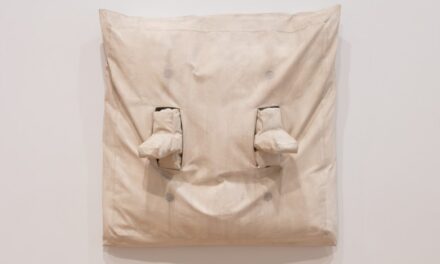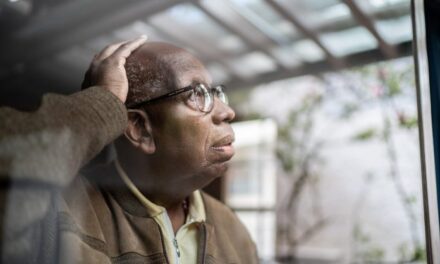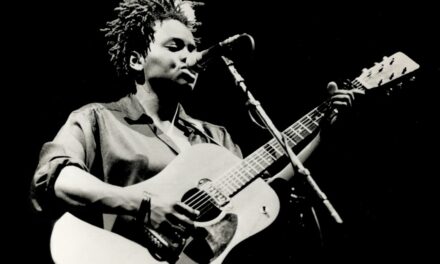To say there were no women in hip-hop at the time Queen Latifah arrived would be a lie. In fact, women were everywhere in 1989: bikini-topped gyrators across Young MC’s “Bust a Move,” tank-topped bitties hopping on Tone Loc after a “Funky Cold Medina,” disembodied moaners on the chorus of 2 Live Crew’s “Me So Horny.”
Then Dana Elaine Owens from Newark pops onto the scene with a tribal sash, the stature of the power forward she once was, and the voice of a classic closer. Just like that, we will spend the next three decades wowed by her music and on-screen presence. In 1989, this dignified lady is just 19, but she’s already making a powerful statement with lyrics like this snippet from “Ladies First”:
I break into a lyrical freestyle/ Grab the mic, look into the crowd and see smiles/ ’Cause they see a woman standing up on her own two/ Sloppy, slouching is something I won’t do
There is a lot you can write about Latifah as she begins to get her just rewards, which include being recognized on Dec. 3 as a Kennedy Center honoree. There’s that multi-hyphenate stuff that comes when your trophy case includes a Grammy (rap solo performance for 1993′s “U.N.I.T.Y.”) and an Emmy (for 2015’s “Bessie”) and your résumé features an Oscar nomination (2002’s “Chicago”), a talk show, an action TV series (“The Equalizer”) and acting roles that range from Matron “Mama” Morton in “Chicago” to Sasha Franklin in “Girls Trip.” She can rap, but she’s also got a two-octave reach that’s Broadway level. Just listen to 2004’s “The Dana Owens Album,” in which she tackles everything from Al Green to the Mamas & the Papas. But when it became clear I wouldn’t be able to talk with her — the actors strike hit and her reps couldn’t make her available before my deadline — I decided to focus on one important moment: her arrival.
That takes us back to Latifah’s 1989 debut, “All Hail the Queen.”
Latifah wasn’t the first woman to rap. MC Sha-Rock was on the mic in the late ’70s, her echo-packed delivery most notably influencing Run-DMC as she rhymed for the Funky 4 + 1. Salt-N-Pepa broke it wide open in 1987 with the Top 20 hit “Push It.” But Latifah, two years later, arrived with no spandex and a different message. This wasn’t about getting the party started. This was about reframing the way female rappers are perceived as artists, and about those artists taking responsibility for what they say.
Start with the album cover: The Queen is set in black against an all-white background broken up only by a map of Africa hovering over her left shoulder. Her back is straight; she’s staring right at us with a powerful directness. Her arm is bent at the elbow as if we are her subjects. This is not someone who is going to be straddling anything onstage. This is the Queen. That map signals political consciousness, in sync with the wave of Pan-African intellectualism also driving film director Spike Lee and rappers like Public Enemy and Boogie Down Productions. There is a sense that she knows the only way to march forward is to remember the past. In the Queen’s case, that means introducing images of Angela Davis, Cicely Tyson and Harriet Tubman onto MTV.
That’s no small thing for a 19-year-old. Think about the Beasties, who would mature and establish their own world-conscious approach. But when the rap trio arrived, they were focused on getting their giant penis prop onstage, not huddling with the Dalai Lama. Latifah (born 1970) had a sense of mission from the start, even if politically conscious rappers like Chuck D (born 1960) and KRS-One (born 1965) were older.
Fact is, none of this matters if “All Hail the Queen” is a dry lecture. It isn’t. The album smokes. Tommy Boy, which signed her, offered up De La Soul, and Latifah also got help from KRS-One on “Evil That Men Do.” But really, she’s doing this on her own. The opener, “Dance for Me,” samples Sly and the Family Stone and Kool & the Gang, establishing the voice. We understand immediately that a poet has picked up the mic. She declares her intentions — “This MC stands for Microphone Commando” — without forgetting to balance the bravado by dropping the names of her DJ, Mark the 45 King, and her beloved older brother, Lance. (Tragically, Lance, a police officer, would die in 1992 in a motorcycle accident.)
Latifah does not shy away from old-school braggadocio, but this isn’t about money or sex. In “Wrath of My Madness” and “The Pros,” she’s establishing her MC skills.
I want to return to the high point of “Hail,” to a song she still does most nights. “Ladies First” was the third single off the album and was important in establishing one important element of her mission. Latifah is speaking to the girls coming up, wondering if they’re doomed to serve as a Sir Mix-a-Lot extra.
“I wanted to uplift women,” Latifah told the BBC in an interview. “Being a cool-ass girl who hangs around a lot of dudes, you see women who have low self-esteem and so they’re taken advantage of by men. You see the difference when a woman’s self-esteem is high. She makes better decisions for herself. She makes better choices.”
Mark the 45 King came up with the beat, engineer Shane Faber wrote the bass line, and Latifah developed the hook. It’s a powerful record, and even then, Latifah needed to overcome the obvious double standard to get it into the world.
Just watch the video. Young MC, in his MTV spot, gets to move from a club to a school lunchroom to a movie theater. Latifah and Monie Love are framed by what looks like an industrial park and an overgrown parking lot. The other stars of the video are the interspersed clips, showing a series of powerful Black women and scenes of unrest from apartheid-era Africa. We also see a bare-bones cut-in of Latifah at a board, the militaristic leader sliding Black Power fists to knock the white chess figures onto the floor.
Monie Love, the British rapper she met while out on tour, shares the mic. This isn’t just about me. This is a movement.
That’s how the Queen brings it home. She reminds us that there are roles for women in music beyond eye candy and even backup singer. Latifah, with her final rhyme, blows those clichés apart.
“He wants me to sing but I swing, so meanwhile/ A footnote for the opposite sex/ Monie ripped the mic, I rocked it next./ Plex, you never catch me at my worst/ You get the drift, Ladies First.
The Kennedy Center Honors will be broadcast Dec. 27 at 9 p.m. on CBS and stream on Paramount Plus.



